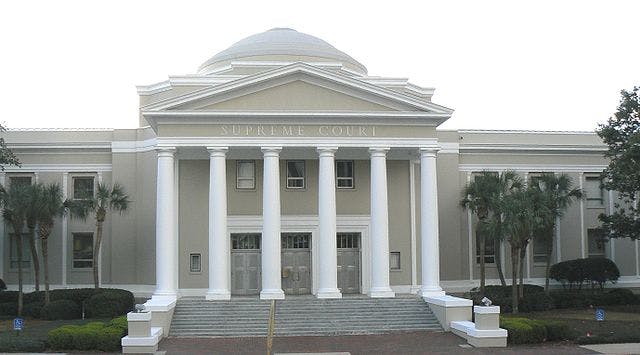Florida Judge Halts State Abortion Law, Citing State Constitution’s ‘Right to Privacy’
The ruling in Florida suggests that provisions in state constitutions might be a viable avenue by which abortion rights could be preserved against current or prospective bans.

A ruling by a judge in Florida calling the state’s 15-week abortion ban incompatible with the Sunshine State constitution could bolster similar efforts in other states to preserve abortion rights by falling back on their state constitutions.
The Florida judge, John Cooper, a rider on the state’s second circuit, ruled that the ban violates the “right to privacy” enshrined in the state’s constitution and said he would issue a temporary injunction to stop the ban from going into effect.
On appeal, the judge’s ruling could end up before the Florida Supreme Court, which leans conservative.
Constitutions in 11 states have been recognized in court as protecting abortion rights, according to the Center for Reproductive Rights. The ruling in Florida suggests that such constitutional provisions might be a viable avenue by which abortion rights could be preserved against current or prospective bans in those states.
Florida’s constitution was first recognized to protect abortion in 1989, when the state supreme court ruled that the procedure fell under the amendment guaranteeing a “right to privacy,” which voters enshrined by referendum in 1980.
“Every natural person has the right to be let alone and free from governmental intrusion into the person’s private life except as otherwise provided herein,” Section 23 of Article I of the state’s constitution says.
Judge Cooper on Thursday referred to this section, along with the earlier precedent, when issuing his ruling.
“The Florida Supreme Court has determined Florida’s privacy provision is clearly implicated in a woman’s decision in whether or not to continue her pregnancy,” he said.
“While this is only a first step in fighting this dangerous abortion ban, we are grateful this court recognized that it is an unconstitutional intrusion on our patients’ and providers’ medical decisions,” the president of Planned Parenthood of Southwest and Central Florida, Stephanie Fraim, said.
Florida’s ban on abortions after 15 weeks of gestation was enacted in April and signed by Governor DeSantis. The lawsuit against it was brought by the American Civil Liberties Union of Florida on behalf of two Planned Parenthood offices and six abortion providers, who called it “a brazen attempt to override the will of the Florida people.”
Supporters of the new abortion ban argue that the lack of explicit language enshrining abortion in the constitution means that it is not constitutionally protected.
“No right to kill a preborn child exists in Florida’s constitution,” the founder of anti-abortion group Live Action, Lila Rose, told the Sun. “Even if the Florida state constitution guaranteed the right to abortion — which it does not — the federal Constitution guarantees to all persons ‘the equal protection of the laws,’ whether born or preborn.”
An attorney for the anti-abortion group National Right to Life, James Bopp, told the Sun that the ruling in Florida is likely “a remnant of history” and said it’s “highly likely” that the state’s “very conservative” Supreme Court will reverse the decision.
However, Mr. Bopp conceded that similar rulings “could be a danger in other states.”
While 11 state constitutions have language that has been determined by courts to protect the right to abortion, none of them explicitly protect the practice. These states include Arizona, Iowa, and Montana, which are weighing abortion bans following the overturning of Roe v. Wade by the U.S. Supreme Court earlier this week.
“Over three decades, state courts have built a foundation of novel jurisprudence that recognizes strong personal privacy and autonomy rights, equality principles, and the deeply rooted nature of abortion protections in history and text,” the Center for Reproductive Rights said in a report on these states’ constitutional protections.
Following Florida’s decision, these states could be next to attempt to use the language of their constitutions to overrule abortion bans.

